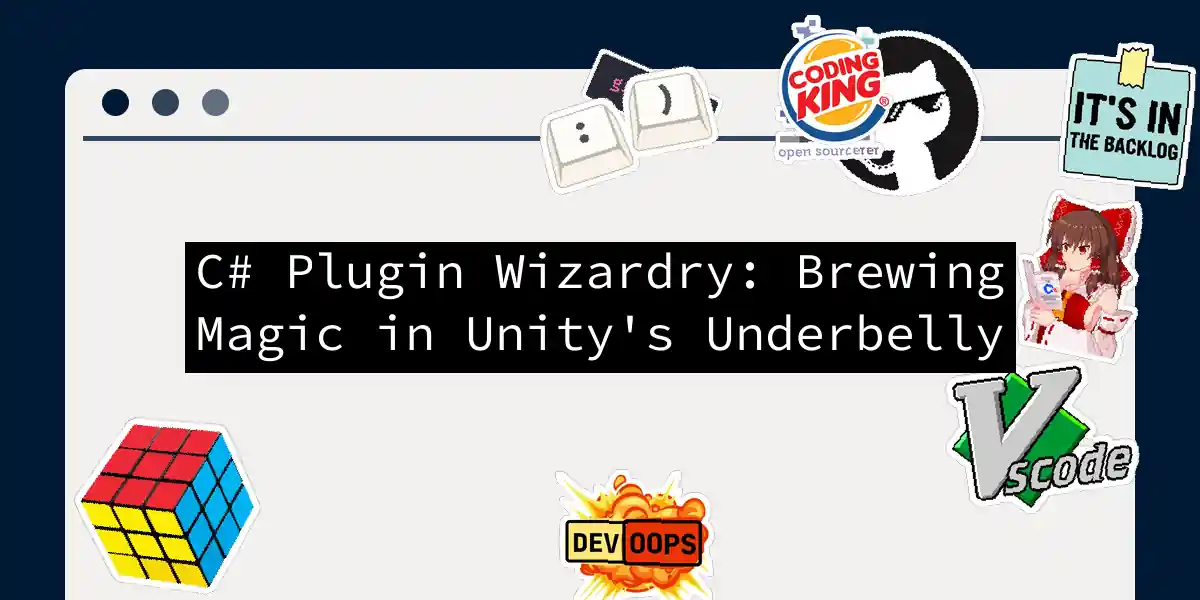When Unity’s built-in features feel like trying to fight a dragon with a butter knife, plugins become your enchanted broadsword. In this guide, we’ll transmute C# code into native power-ups while dodging memory leaks like they’re poorly coded Minotaurs in a labyrinth.
Forging the Native Crucible
Every great plugin starts by angering the right gods - in this case, your OS’s compiler. Let’s create a C++ spell that makes numbers go boom:
// MagicNumbers.h
#pragma once
extern "C" {
__declspec(dllexport) int NuclearMultiply(int a, int b) {
return a * b * 1000; // Because regular multiplication is for Muggles
}
}
Place this radioactive code in your Assets/Plugins folder like:
Assets/
└── Plugins/
├── Windows/
│ └── NuclearMath.dll
├── macOS/
│ └── libNuclearMath.bundle
└── Linux/
└── libNuclearMath.so
Now summon this dark magic from C#:
public class NumberAlchemist : MonoBehaviour
{
[DllImport("NuclearMath")]
private static extern int NuclearMultiply(int a, int b);
void Start()
{
Debug.Log($"2 x 3 = {NuclearMultiply(2, 3)}");
// Output: 2 x 3 = 6000 (You're welcome)
}
}
The Interop Dance Floor
When C# and C++ tango, you need proper choreography. Here’s how to avoid stepping on memory toes:
[StructLayout(LayoutKind.Sequential)]
public struct Vector3D
{
public float x;
public float y;
public float z;
public float w; // For that extra dimension flavor
}
[DllImport("PhysicsWizardry")]
private static extern void CalculateQuantumTrajectory(
ref Vector3D position,
out Vector3D velocity,
int debugLevel);
Remember: Marshaling is like herding cats - do it wrong and everything gets scratched. Use MarshalAs attributes like garlic against vampire data types.
Debugging the Arcane
When your plugin crashes harder than a goblin-made flying car:
- Check architecture (x86 vs x64) - It’s like fitting an ogre in fairy shoes
- Verify export names -
extern "C"is your naming shield - Use Dependency Walker - The crystal ball of DLL inspection
- Log to files - Because Unity’s console is where logs go to retire
Performance Alchemy
Turn CPU cycles into philosopher’s stones with these incantations:
- BurstCompiler: Because even magic needs optimization
- Memory Pininvoke: Like freezing Han Solo in carbonite (temporarily)
- Threaded Sorcery: Multithreading without summoning thread demons
unsafe void SummonDemonsResponsibly()
{
fixed (float* ptr = &giantArray)
{
NativeProcessData(ptr, giantArray.Length);
}
}
The Grand Grimoire
Complete plugin example for reversing strings (because sometimes you need to speak in tongues):
// BlackMagic.cpp
extern "C" {
__declspec(dllexport) char* ReverseString(char* input) {
int length = strlen(input);
char* reversed = new char[length + 1];
for(int i = 0; i < length; i++) {
reversed[i] = input[length - 1 - i];
}
reversed[length] = '\0';
return reversed;
}
}
[DllImport("BlackMagic")]
private static extern IntPtr ReverseString(string input);
void Start()
{
string normal = "Hello";
IntPtr reversedPtr = ReverseString(normal);
string reversed = Marshal.PtrToStringAnsi(reversedPtr);
Debug.Log(reversed); // Outputs "olleH"
// Remember to free the memory unless you want a poltergeist
Marshal.FreeCoTaskMem(reversedPtr);
}
When to Summon the Dark Arts
Plugins are perfect for:
- Raw number crunching (Particle systems gone wild)
- Hardware whispering (Direct GPU flirtation)
- Legacy code resurrection (Zombie DLLs from 1998)
- Platform-specific shenanigans (Windows Registry diving)
But remember: With great power comes great “why is my editor on fire?” moments. Always keep a Unity restart incantation handy (
Ctrl + Alt + Delfor the uninitiated). Now go forth and optimize - may your frame rates be high and your thermal throttling low! Just don’t blame me when your computer starts muttering in Aramaic during compilation.
